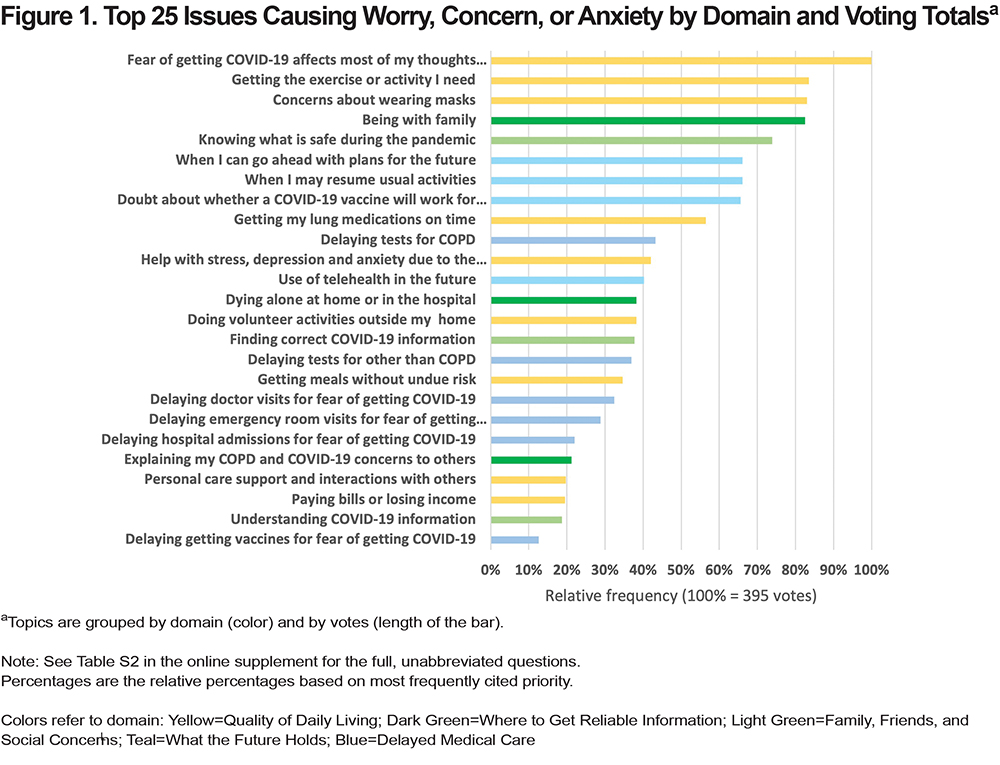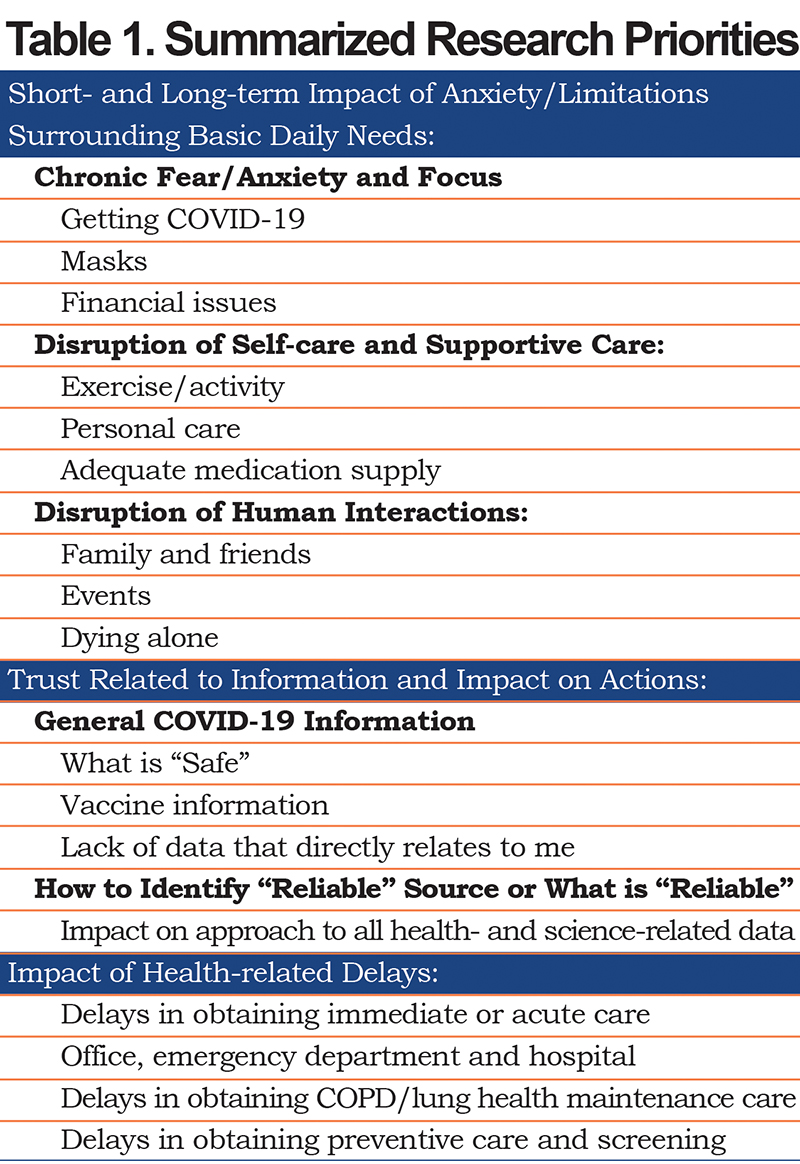Running Head: COVID-19 and COPD Research Agenda
Funding Support: This work was funded through a Patient-Centered Outcomes Research Institute® (PCORI®) Eugene Washington PCORI Engagement Award (EA-PPRN-00035) awarded to the COPD Foundation. The content is solely the responsibility of the authors and does not necessarily represent the official views of PCORI.
Date of acceptance: April 21, 2021 │ Published online: April 23, 2021
Abbreviations: severe acute respiratory syndrome coronavirus-2, SARS CoV-2; coronavirus 2019 disease, COVID-19; COPD Foundation, COPDF
Citation: McCreary G, Boyce D, Houlihan ME, et al. Patient-driven research agenda: what needs to be studied in those living with COPD during the coronavirus disease 2019 pandemic. Chronic Obstr Pulm Dis. 2021; 8(3): 314-318. doi: http://doi.org/10.15326/jcopdf.2021.0203
Online Supplemental Material: Read Online Supplemental Material (549KB)
Introduction
Several reports have been published addressing the potential impact of the severe acute respiratory syndrome coronavirus-2 (SARS CoV-2), or coronavirus disease 2019 (COVID-19) pandemic on the health and well-being of health care workers, people who develop COVID-19, and those impacted by the changes that occurred and were mandated to prevent pandemic conditions from worsening.1 Many of those reports have focused on mental health impacts, identifying older adults and especially those with chronic conditions such as COPD, as not only at greater risk of developing COVID-19, but of also suffering significant impacts of the mandated social distancing and resulting social isolation.2-5
Previous work from the Centers for Disease Control and Prevention, the media, and researchers have highlighted mental health concerns related to social isolation,2,3,6-8 but few studies have addressed the broader COVID-19-related health concerns or translated the concerns into research agendas from the patient-community perspective. To address this gap and attempt to better understand the pandemic’s impact on the concerns about health and well-being from people with COPD, the COPD Foundation (COPDF) developed a survey to identify issues people with COPD thought were priorities for researchers to study. The goal is to stimulate research based on this patient-driven research agenda for both mental health and general health and well-being concerns of people living with COPD during the COVID-19 pandemic.
Methods
Using information published in the medical literature and on social media, we developed the COPD and Coping with COVID Pandemic Survey, which was offered to all members of the COPD Patient-Powered Research Network (PPRN),9 the COPDF’s online registry of individuals with COPD and those who report factors that put them at increased risk for COPD. Members reporting a prior diagnosis of COPD were invited to complete the survey. (Table S1 in the online supplement) The survey was divided into 7 domains: “Activities,” “Living Situations,” “Health Care Use and Self-Management,” “Getting and Interpreting Data on Risk, Safety, and Suggested Actions,” “the New Norm,” “Finances,” and “Coping Strategies and Abilities,” with multiple potential problems and concerns under each of the domains. The list of domains and questions was reviewed, modified and enhanced by the patient coinvestigators (MEH, JR, CR, KD, WC). A total of 724 members of the COPD PPRN completed the survey and categorized issues they found “not at all bothersome” to “very bothersome.” We used these reports to identify the 25 issues reported to be most bothersome in causing worry, concern, or anxiety.
The list of 25 issues were then used for crowdsourced voting on the COPDF’s social online community, COPD360social.10 To date >50,000 individuals are members of COPD360social. Voting to prioritize the 25 issues resulted in over 500 votes cast between September 28 and October 30, 2020.
This project was reviewed and approved by the Western Institutional Review Board as exempted research.
Results
The prioritized list of issues is summarized into 3 major categories: (a) short- and long-term impact of anxiety, worry or concerns surrounding doing and meeting basic needs such as activity, self-care and management, and support and interactions with family and friends; (b) re-establishing trust in health care-related information; (c) short- and long-term impact of delays and barriers to health care and health-related prevention services. A list of all topics and the votes they received is presented in Figure 1. Topics are grouped by domain (color) and by votes for each (length of the bars). Abbreviations were used for Figure 1 with the full questions presented in Table S2 in the online supplement. The issues are summarized into 3 general research domains in Table 1.


Discussion
In this project, people living with COPD report they are experiencing and suffering from many of the same mental health concerns as highlighted in previous publications—fears, anxieties, and isolation.2-4,6-8 Indeed, mental health and the potential adverse effects from these fears and concerns on general health and well-being, as well as respiratory or COPD-specific health status, should be the topic of ongoing studies.11,12 However, the COPD community's report of prioritized research topics expands beyond those concerns to express fears and worries about the impact of the pandemic on delays and barriers to needed health care both now and for prevention of future problems related to both COPD and their general health. Such a decline and delay in health services has been reported but usually is not presented from a patient perspective.5 From our survey respondents’ votes, it is clear that missed and delayed health care services are also a concern for the patient community with respect to their current and future health status and deserves appropriate investigation efforts. And finally, a concern expressed by many in the scientific community 13,14 is confirmed by the community living with COPD—uncertainty about the future and where to find reliable health-related information now and in the future. Work to determine how to regain public trust, especially from older adults and those with chronic illnesses, needs to be added to the agenda of improving trust from a racial and health equity perspective.15
Conclusions
The health and well-being concerns of people living with COPD during this pandemic expand beyond the important and well recognized social isolation, fear, and anxiety related directly to preventing or not being able to prevent a COVID-19 infection “on top” of their COPD.Some of the issues, such as knowing which mask to use and problems with wearing masks, are likely to be resolved as the pandemic ends. However, other issues will continue as will the impact of those issues, such as delayed preventive or follow-up care that occurred during the pandemic due to fears of visiting health care facilities, lack of transportation, and inability or willingness to use telehealth services. Our broader patient-prioritized research agenda should help guide the work of individual researchers related to COVID-19 impact in populations of older adults living with COPD and other chronic diseases. The agenda highlights the need for funding groups to consider broad research priorities going beyond the important areas of mental health and social isolation. Additionally, these patient-identified priorities should be considered in subsequent disaster and future pandemic planning efforts.
Declaration of Interest
Dr. Yawn has served on advisory boards related to COPD for AstraZeneca, GlaxoSmithKline, TEVA and Boehringer Ingelheim. She has received research funding from and served as a study design consultant for GlaxoSmithKline related to COPD. All other authors have nothing to declare.